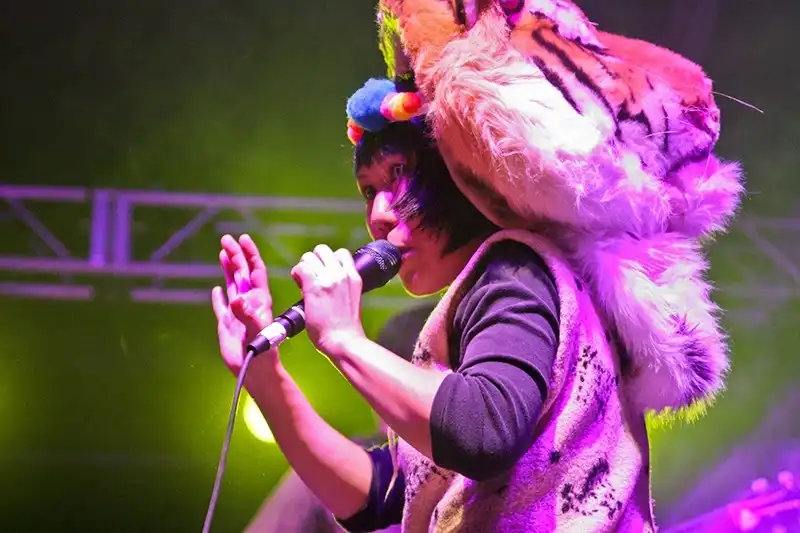Deerhoof @ Urban Lounge 11.10 with LXMP and Palace of Buddies
Show Reviews
The trio of bands at the Urban Lounge last Saturday night each, in their own ways, was performing a kind of deconstruction on the ideas and structure of rock and pop music, and redefining the nature of experimentation. Local openers Palace of Buddies, who have released several albums on Kilby Records, started the evening off with a brief, 30-minute set that was still densely packed with musical ideas that pack plenty of polish in their own right; the experimentation is in the ways they combine ideas to create something that’s a satisfying totality.
Their sound has progressed from their first, self-titled album in 2009 in which a song like “Casio Burger Meltdown,” which plays around with the cheesiness of some of their instruments, has a fluidity and sophistication of sound that’s not always found in local bands. They melded the influence of ’80s synth bands like New Order, some proggy polyrhythm and even a touch of disco in the tempo of the drumming.
Drummer/keyboardist Nick Foster’s BA in music composition from the University of Utah evidenced itself in the use of repeated musical phrases with sometimes only minor changes over the course of a song, using minimal means to communicate a lot of depth, like Stereolab or Brian Eno. With the truncated opening set times, openers are compelled to deliver a lot in a relatively short span, and their impressive performance makes me eagerly await another release from them.
Next up was the duo LXMP from Warsaw, Poland. Their combination of keyboard sampler and sundry electronic devices along with a live drummer was like an alternative musical syntax in the language of dance music. This was not least the case when they did some extended riffing on songs from their recent release, Back To the Future Shock, which is basically Piotr Zabrodzki and Macio Moretti’s mashup/rehash of Herbie Hancock’s pivotal jazz album, Future Shock (enjoying its 30th anniversary), including the instantly recognizable instrumental “Rockit.”
In their, as they said, “33-minute flat” exhibition of highly controlled cacaphony, there was a method to the madness, with nods to house beats as well as European avant-garde dissonance and even electronic kraut rock–like and fusion noodling of bands like Weather Report, and their virtuosity was dazzling. It was a time trip back to the ’80s and ’90s.
Headliner Deerhoof, San Francisco’s long-time indie rock stalwart of the Kill Rock Stars and Polyvinyl labels, is also, in some ways, the hardest to describe. They are poised to celebrate 20 years in existence next year. Ostensibly a “rock band” in structure, with guitars, bass, drums and vocals, their music is in some ways the most challenging listening of the three, although within the structures of a rock n’ roll song. This is because they combine singer/bassist Satomi Matsuzaki’s sometimes childlike-sounding vocal delivery with fairly heavy rock riffs, although those riffs sometimes sputter and stop, only to abruptly flare up again. All this is fueled by Greg Saunier’s incandescent drumming, with its own prog and art punk influence.
Their set ranged from old fan favorites like “Twin Killers” to more recent numbers like “Breakup Songs” from the 2012 album of the same name. In addition to Saunier’s propellant rhythms, the addition of guitarist John Dieterich in 1999 added another dimension, with his acrobatic arpeggios and anguished scrawkfests. The interplay of his guitar work with that of Ed Rodriguez is just one amazing facet of a band that can leave you awestruck and make you ask yourself what the hell you just saw.
Deerhoof are a bundle of paradoxes: both tightly in control in the precision of their playing and seemingly veering out of control like a car with no one behind the wheel into the chaos of oncoming traffic—conventionally rock n’ roll, yet at moments as “out there” as any experimental group. They’re sweet and playful and, at the same time, as brutal as any heavy metal band. On top of that, they reinvent their sound on every release!
Tickets were reduced to half-price with no convenience fee a few days prior, due to slow ticket sales. But the hipster crowd was out in full force, and enthusiastic to hear what some of the hip rags like Pitchfork have called “the best band in the world,” so you wonder if maybe it’s just a hipster thing of waiting to get tickets at the door. There’s certainly no love lost with not paying a “convenience fee” for the privilege of getting tickets ahead of time.
During the middle of their set, Saunier pondered how long ago was the last time the band played Salt Lake. It was, I believe, 2008 at the same place. So much has changed in the world of music and Deerhoof, and so much, thankfully, has stayed the same.
Several friends noted a similarity to Yoko Ono in Matsuzaki’s deadpan delivery, as well as her dance moves, and the band played Yoko Ono’s Meltdown festival earlier this year at the Southbank Centre in London.
At the chant of “Gabba Gabba Hey” from Dieterich, the band tore into the Ramones’ “Pinhead.” Immediately afterward, they settled down for a solemn rendition of the Velvet Underground’s “All Tomorrow’s Parties”—one assumes in tribute to the recent passing of Lou Reed. It was a very moving pause in a set that was fairly frenetic, as is usual for Deerhoof.
They returned to stage for an encore, and Matsuzaki leaned over the edge of the stage during “Come See the Duck,” urging audience members, albeit initially a bit sheepishly, to join in on the word “come.”
Some common threads of all three groups were: trading instruments, polyrhythmic drumming and taking apart and reassembling the DNA of their songs. All put together, it made for a fascinating evening both to enjoy on a visceral “rock” level, as well as contemplate the nature of music.


